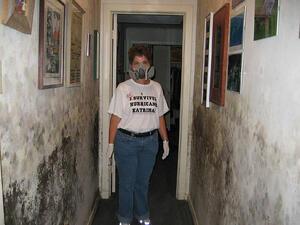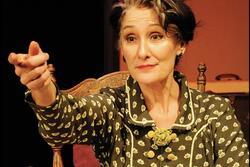Five Years Ago
In late August of 2005, when Hurricane Katrina struck the Gulf Coast, I was lying in a hospital bed in Boston getting nasty medicine through an IV line and receiving all nourishment through another tube. I was feeling pretty sorry for myself until I turned on the generally useless TV and saw what was – and was not – happening in New Orleans. The images of desperate people on rooftops, the misery at the Superdome, water flooding into Charity Hospital made me wonder if my illness and the treatment I was receiving for it were causing me to have delusions. Alas, the devastation was all too real.
It never occurred to me then that the Jews of New Orleans were suffering. If I was even aware that New Orleans had a large Jewish community with deep roots in the region, I assumed that Jewish homes, synagogues, schools were all on high ground, safe from the toxic water that was wrecking African-American neighborhoods. This was not the case as you can see from these pictures on Flickr, collected as part of “Katrina’s Jewish Voices” (KJV), the Jewish Women's Archive project to document the Jewish community’s experience during and after the storm. While Jewish New Orleans was spared the near-total annihilation of the Lower Ninth Ward, Jewish families were displaced, homes flooded, synagogues destroyed, Torahs damaged beyond repair.
It certainly never occurred to me then that within two years, I would be working for the Jewish Women's Archive and helping prepare for a Board meeting in New Orleans that would include a presentation on “Katrina’s Jewish Voices.” By the time the JWA Board met in New Orleans, I was lucky enough to be healthy again. The people of the Gulf Coast would have a much longer recovery. The city we visited in January of 2008 showed signs of the spirit that makes it such a special and well-loved place, but the extent of the physical devastation was shocking. Not just in the ravaged Lower Ninth Ward but in the crumbling shell of the Beth Israel Congregation.
Thanks to the 85 oral history interviews and the 2700 digital objects collected as part of “Katrina’s Jewish Voices,” the story of how Jews experienced Katrina — the trauma, fear, and loss as well as the strength, resilience, and generosity — will be preserved forever. The mainstream media told some of this story. Millions of people saw the dramatic footage of volunteers carrying Torah scrolls out of the flooded Beth Israel sanctuary. But without KJV, would we know how much people who had survived the Holocaust valued the simple connections made possible by the telephone?
Would we know how it felt to be the family whose newborn baby went missing from the hospital, a story that made headlines around the world? Would we know how it felt for people who had always been on the giving side to receive tzedakah? Would we know that Jews were the first and almost the only people to come to the aid of the Gulf’s South East Asian fishermen? The Jewish Women's Archive is working hard to raise enough money to make all of these stories accessible on the Internet.
Five years after I lay in a hospital bed watching on TV as a great American city was nearly destroyed, the city of New Orleans and its Jewish community have come a long way. As of the end of July, 1,220 newcomers have helped the Jewish population of Greater New Orleans reach 90% of its pre-Katrina size.
But now the beleaguered Gulf Coast has suffered yet another disaster. It will be a long time before we’ll know the full cost of the BP catastrophe, caused, like the flooding that followed Katrina, by risky public policy and weak government regulation. This weekend the New Orleans JCC hosted a joyful havdalah to celebrate the rebuilding of the Jewish community on the fifth anniversary of Katrina. There was music by the New Orleans Klezmer All-Stars, dessert, and a presentation honoring first responders; there was also a collection of canned goods for the Second Harvest Food Bank “to help those financially impacted by the oil spill.” Sadly, the region’s famous resiliency is being put to the test once again.







You won't find anyone at the Jewish Women's Archive who thinks the Jewish stories of Hurricane Katrina are the only ones that should be told -- certainly that is not the claim of Katrina's Jewish Voices -- but it doesn't mean that these stories shouldn't be told at all. Documenting the experience of the Jewish community adds to the broader understanding of how Hurricane Katrina affected New Orleans and the Gulf Coast.
Moreover, "Katrina's Jewish Voices" adds to the Jewish American narrative in important ways. Too often the history of Jews in America is limited to stories from New York (and a few other urban communities), leaving out or giving short shrift to Jews in other regions. "Katrina's Jewish Voices" brings to light the experiences of the New Orleans Jewish community (which has a 250-year-long history) and insures that the devastation wrought by Hurricane Katrina, the response to it, and the rebuilding that has occurred since are included in what is known about Jewish life in 21st century America.
This article begins with the author confessing that, despite the obsessively reported images of bloated bodies, unspeakable squalor in the superdome, looting, murder, and mayhem, "... it never occurred to me then that the Jews of New Orleans were suffering."
So what does one do when faced with all this human suffering? One squints, puts on blinders, then sets about to discover and document only the Jewish suffering -- as if recording for posterity the testimonies of KZ-Lager survivors.
This kind of navel-gazing and communal self-absorption has now reached new depths.